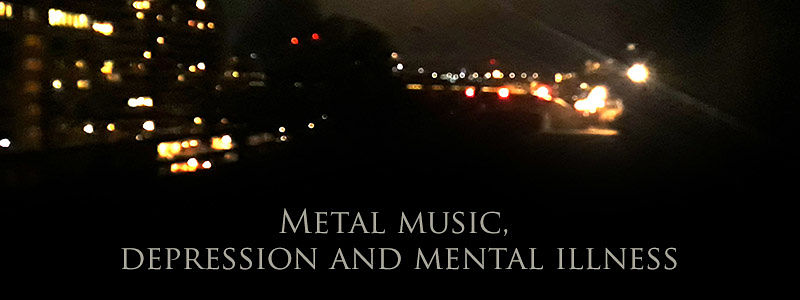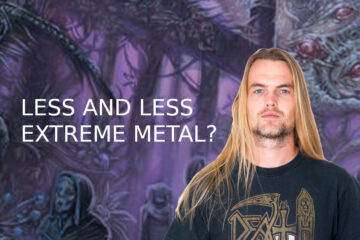
Metal music and mental health has become a pretty big topic, and it’s good that we’re all taking about it. Given the new study showing correlation between extreme metal and happiness, I wanted to finally tackle the metal and depression topic I’ve been meaning to write about for some time.
There are some very interesting connections between extreme metal music and mental health. Sensitive, unique, creative individuals are certainly more common in the metal community and other underground scenes. Music kept me afloat in many ways, both through listening and writing.
This won’t be so much about lyric themes and how much listening to Bloodbath’s “Eaten” on repeat makes you turn into a violent criminal. It will be more about what being an underground music creator and listener can do for outcasts, introverts, victims of depression and other people potentially in danger of mental illness.
About the author

I’m Stefan Nordström, an aspiring musician and content creator. This is one of the ways I promote Soliloquium, my progressive death/doom metal band. If you’re searching for new music in the style, it would be awesome if you listened to my stuff on:
My own way from music listener to creator
The first step for me was listening to music that could channel my youth’s frustration, values and ideas. A second step was getting that energy into my own music. The third and most important part of my evolution was writing deeper, more meaningful lyrics and developing themes.
In all these phases of my life and my musical evolution, metal and other underground music had an important role on keeping me somewhat on track.
Youthful metal vigor, Dismember shows and the other side of dark music
Early on, the death metal and thrash metal scene caught my interest. I had been into melodic death metal like In Flames and Children of Bodom, but nothing prepared me for the experience of going to a Dismember show. At the same time, the crashing riffs and breakdowns of Testament, Kreator and Slayer took over my playlist.
Misplacement and alienation
Like most 17-year olds, I had no idea who I was, or why I was feeling like I did. I knew I was angry and misplaced. There was a sense of empowerment in the furious death metal and thrash metal energy. I didn’t care much about lyrics, except perhaps hating on religion a bit. I picked up my first guitar, got myself Guitar Pro 4 and tried to learn some of the tunes.
In this stage I was fortunate enough to live in a bubble in terms of adulthood and money. I could focus on growing and exploring music in ways many others couldn’t. I was partying hard and raging at every death metal show I could find between 2003 and 2008.
Seeds of depression and anxiety were there, but the youthful simplicity of it all definitely kept it at bay. I was never a person that searched for an identity, but at this time in my life metal definitely helped combat a lot of my darker impulses. It gave a focal point at a time where I definitely had no idea who I was in any kind of way.
A new side of heavy music
During this phase, the other side of dark music slowly entered my life. Katatonia’s “Last Fair Deal Gone Down” and Anathema’s “Judgement” started fascinating me. It was metal, but not quite metal. I wasn’t sure what to make of it yet, but I was hooked.
The albums spoke to my rising depression and anxiety problems in a whole different way. I became interested in writing lyrics beyond the Dismember and Bloodbath rhymes I constructed for my early riffs. My interest in listening to and writing doom and progressive music grew.
From metal listener to metal creator
In 2010, the idea of full-time studies came along; the start of unrealistic expectations and a long fall into depression. 2009 marked the enthusiastic beginning of my death metal band Desolator. The start had a youthful romance to it. We were young kids forming a band, with plenty of time to rehearse, write songs and make spontaneous plans.
As my studies (and my depression) progressed and others around me made a more graceful transition to adulthood, the leash grew tighter. Slowly, I became exposed to the trauma of being a passionate music creator in an underground genre.
Desolator grew serious, got a drummer and released “Unearthly Monument” in 2013. 2016’s “Spawn of Misanthropy” marked the step from a decent Swedish-sounding band to unique one with its own style and themes. Soliloquium released full-lengths “An Empty Frame” (2016), “Contemplations” (2018) and “Things We Leave Behind” (2020).
Career, metal music and mental health
As my dedication grew, the leash tightened even more. Business aspects got involved, the sad reality of music promotion showed its ugly face, and everyone involved just seemed to get less time and energy in adulthood. This was the time to leave and get a “regular” life setup, especially for someone like me.
During these years, I was studying and developing a career in marketing. I was exposed to career aspects that are rough for a fully functional person. As a hypersensitive, introvert, depressed person that hadn’t quite realized the limitations, this was pure poison.
The problem was, as the issues progressed, it also felt more and more like I had something to say. The music grew to a real vessel of personal expression, not just a fun way to use my energy.
I became more or less addicted to writing things about my view on the world. Nothing else could get me more in the moment and in my true zone. It’s one of the things in the world that’s truly mine.
Lyrics – from catchy songwriting to depression
My two Desolator lyrics from the “Spawn of Misanthropy” EP took on a whole new nihilistic, insightful tone. There was no interest in writing about violence, zombies or anything like that anymore.
I wanted to share my insight, often my own feeling of plight, in my music. It felt good to put it to words, and I also hope some people got a wider understanding for why I was so fucked up at times.
“An Empty Frame”
This hadn’t quite prepared me for the words coming out of my mouth on Soliloquium’s debut full-length “An Empty Frame”. I was experiencing truly being in the zone around writing these releases. Much of it wrote itself, and I was almost left to interpret myself when hearing the songs.
Sure, some of them were classic death/doom metal lyrics, but “The Observer” and “Procession” saw me express foreboding ideas that I should have picked up on myself.
The thoughts about society and its many black sheep, the mental health epidemic and the sympathy for other outcasts arrived. Desolator was the aggressive side, and Soliloquium the sympathetic one.
“Contemplations”
This culminated on Soliloquium’s 2018 album “Contemplations”, which ironically was released just about when I mentally hit the wall completely, overrun by anxiety and depression.
“Contemplations” is an unbelievably inward-turned album, filled with nagging thoughts and anxiety. “Chains” tells of the chemical, illogical whirlwind that is depression. “Catharsis” follows it up by telling the tale of becoming an effective survival machine, ignoring all the small moments and the now for a non-existent endgame.
“Unfulfilling Prophecy” slashes the horrors of 9-5 existence wide open for all to see. As if this wasn’t enough, it’s all veiled in a sense of hurtful nostalgia. I was growing old, and nothing interesting was happening anymore.
Depression finally taking its toll
It was as if the metal music I wrote completely described the underlying reasons before the fact. Depression hit, and I found myself completely apathetic and unresponsive for months. Recording the new albums, along with moving, working out way too much and insane amounts of career stress brought me to my knees.
Suddenly, I was unable to do anything but sleep. Everything caused me stress and everything became a burden, music included. For a few months, I lingered and tried to recover. Progress was extremely slow and I don’t even think I’ve made it half-way by now, almost a year later (this was written back in 2019).
Doom metal, mental illness and a strange sense of hope
A lot of what was happening in this stage explains the coming Soliloquium album (“Things We Leave Behind”, which is now out). Some of the songs are utterly dark, while others are empowering, or even hopeful. It was a twisted time of depression and anxiety with a whole new crippling power. But it was also the time where I started taking decisions that actually took care of myself.
At this point everything caused me stress and set me off, so just finding any detail where I could be in the moment was a huge win. Composing the songs went very fast, and the lyrics went even faster.
I believe writing the material gave me the chance to put a lot of messy, contradictory things into words and concepts. Composing an album was not something I expected to do for years. To do it as a passionate activity in this state was a feat I didn’t think possible.
Somewhere in this mess, the natural urge to write music came back. I picked up my guitar and started checking out some old Soliloquium song projects. Most of them were thrown out or rearranged. Writing quickly became a place where I got back into my zone, even if it was for smaller windows.
“Things We Leave Behind”
2020 saw the release of this album, entitled “Things We Leave Behind” – another step when it comes to connecting metal music and mental health. Because, as I said, in the midst of all this personal chaos, inspiration came. I promised myself to really chill on the songwriting in 2019.
And I suppose that lowered pressure suddenly made me inspired, since creativity came fast. I created a whole record in a matter of months, and damn, the connection between metal music and mental health is strong on this one. It wasn’t a conscious choice; it may sound pretentious, but the album pretty much wrote itself.
Both pre-release singles talk about different aspects of mental health:
- “Dead Ends” tells the tale of completely hitting the wall, opening the album on the darkest note possible
- “The Discarded” is the outcast theme, questioning why society simply shuts out anyone deemed insufficient
Metal music and mental health – the negatives
Beyond my own strange journey from drunken death metal kid to composer, there are obviously plenty of other things to consider. The metal community can be both a nice and ugly place, especially online. There are two factors that I find especially damaging.
Communal attitude – for good and bad
Many people look down on different genres, bands and styles, and in this way metal and mental health can get a negative connection. I believe this is especially true for the younger crowd. There’s just a lot of peer-pressure and pointless bullshit going on, be it genre-tags or what you’re supposed to like to be in.
Personally, I’ve never been to interested in the communal nature of metal music, but I’ve certainly dished out a lot of music elitism in my time. However, for sensitive individuals, I bet it can definitely be a negative trigger. Not to mention that it could stop you from finding awesome music, just because the genre tag is the wrong one.
Musicians at risk
For a metal composer, it can be extremely tough to know that writing music is likely to never be the main activity in life. Soulless work, money problems and other issues easily get the music out of focus. It can even make it a burden, as it did for me before I found the joy in it again.
Another aspect is how super-expensive it is to properly promote a band these days. Social media is a locked pay-to-play game. These things can definitely get me and drag me into depression at times, until I’m able to turn back and realize why I’m writing music in the first place.
I believe metal and mental health gets a connection because of this underlying recipe of sensitive, creative people and the many sect-like aspects of metal. Not too mention the constant popularity contests in something that should be spared from it.
Metal music and mental health – final words
I guess what I’ve been trying to say about metal music and mental health during this article is that I believe it’s pretty damn therapeutic.
For some, it’s a matter of heading to an awesome show to be in the moment for a while. For me, writing an album dedicated to depression and anxiety has been the way to withstand it. Not to mention that it’s been a productive way to deal.
I think metal draws a lot of people who could’ve been into some pretty fucked up things. Metal and depression (others forms of mental illness too, of course) is definitely interconnected in that way, both when it comes to its listeners and songwriters.
Personally, it’s been interesting to switch around. Early on, I found a lot of brilliant metal music that expressed the things I wanted to say, but was unable to conceptualize. My wish is of course that my insights in Soliloquium’s new music does the same for someone else.
Life is a messy thing for me, and most times I just find myself not getting people and society. Music is a place for that, since it’s a window to unwind from the pressure. Attending a gig or writing a song is the ultimate way to escape depression and be in the moment, which could be a literal life-saver for some.
Read more:
My depression and anxiety experience ->
My introvert experiences ->
10 essential death/doom metal albums ->
Soliloquium, Swedish progressive death/doom metal ->







0 Comments